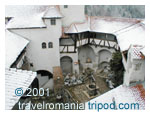| You are on https://travelromania.tripod.com/m_letter_mtr_merger.htm | |||||||||
 |
 |
||||||||
| ROMANIAN ARTS AND CULTURE | :: HOME :: | ||||||||
Three Prestigious Museums Diverted from Their Work and Mission
Romanian institutions as prestigious as the Romanian Peasant Museum need the inspired support of the state, and Romania needs culture. By merging the two museums, both will in fact be deliberately destroyed. Each of them has a specific profile which we'd do well to respect and help grow, rather than axe, ignoring their call and wiping out the work and searches of several generations. The Village Museum studies and exhibits ethnographically complex objects -- from homes from various regions of the country, with their marked perimeters, annexes and interiors, as well as characteristic tools, to the village landscape, with lanes, craftspeople and church. The Romanian Peasant Museum, clearly delimited by name, raises the problem of the villagers, with their vision of the world, with their values and concepts, encouraging the lively dialogue between the peasant civilization we come from and the modernity, which we wish enlightened and warmed by the past, of our days. Each of them has accumulated in time a huge material which they are going to manage and bring year after year to the visitors, be they from Romania or abroad. Each continues to develop innovative projects and has, out of necessity, an individual vision for showcasing its objects. Moreover, each deserves the undivided attention of the government, or of the line ministries; in fact, they not only deserve it, but demand it through the visibility and exceptional qualities they have demonstrated. Both museums enjoy a large visibility and appreciation in the European Union and have garnered prestigious prizes; both are places of cultural pilgrimage not only for Romanians, but also for those who, in other countries, search for a way to harmonize lives which are inevitably caught in the tension between past, present, and future aspirations. Both illustrate the capacities of creation and synthesis of the Romanian people and constitute sources of inspiration to use joyfully. To host an institution which needs space in the place occupied by a renowned museum like the Antipa Museum, which has already restructured its space according to its own exhibiting necessities, to then move two other first-class museums in a dark and bizarre castling move, is a serious act of cultural aggression. I don't think it suits either the government or the various ministries involved. And I'm sure that, upon reflection, they will reconsider a measure in which rash decisions, uninformed or indifferent to what we should happily respect, have created a feeling of uncertainty and a burden among museographers and our specialists in social sciences, and, on the larger arena, in the various areas of Romanian and European culture, and among the large numbers of those who love and respect our past, reflecting actively on what we owe to it and how we continue it. With a few pen strokes someone who doesn't understand these museums can divert them from their deep purpose, defined with hard work, over many years, by many lovers of culture. Museums in the class where these three belong, and where we don't have many, don't rebuild easily. Last summer, in Paris, I saw photographs of some exhibits of the Romanian Peasant Museum. It was neither the first time nor the first place of showcasing in France the work of this museum. Others can share other experiences. Mine was special insofar I visited the Romanian Peasant Museum in Paris, thanks to a Frenchman's initiative, on an ordinary summer day, without anniversaries of special occasions. I held my head high and felt like an active and acknowledged part of Europe. I owe the joy of this moment to my colleagues at the Romanian Peasant Museum. The obligation to ensure the continuity of their work behooves all of us and cannot be passed over by the government institutions meant to represent our cultural life. |
|
||||||||
| BOOKS | |||||||||
|
|
|||||||||
| Copyright © 2001-2014 Raluca Preotu. All rights reserved. | |||||||||